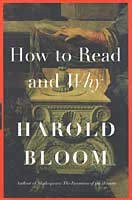|
 In
his masterpiece "Walden, or Life in the Woods," Henry
David Thoreau wrote, "To read well, that is, to read true
books in a true spirit, is a noble exercise." Professor
Harold Bloom takes this noble exercise one step further in his
outstanding "How To Read And Why." In the book, Bloom
delights in the philosophy of reading and the motivations behind
it: "Information is endlessly available to us; where shall
wisdom be found?…reading well is one of the great pleasures that
solitude can afford you, because it is, at least in my experience,
the most healing of pleasures." It matters, according to
Bloom, to read for one’s own enlightenment and for people’s
"capacity to form their own judgments and opinions." In
his masterpiece "Walden, or Life in the Woods," Henry
David Thoreau wrote, "To read well, that is, to read true
books in a true spirit, is a noble exercise." Professor
Harold Bloom takes this noble exercise one step further in his
outstanding "How To Read And Why." In the book, Bloom
delights in the philosophy of reading and the motivations behind
it: "Information is endlessly available to us; where shall
wisdom be found?…reading well is one of the great pleasures that
solitude can afford you, because it is, at least in my experience,
the most healing of pleasures." It matters, according to
Bloom, to read for one’s own enlightenment and for people’s
"capacity to form their own judgments and opinions."

Central
to the author’s enthusiastic endorsement of reading are his five
principles for the restoration of reading.
1.
Clear your mind of cant (cant referring to the peculiar
vocabulary of a particular group). Bloom cites the
"university culture where the appreciation of Victorian women’s
underwear replaces the appreciation of Charles Dickens."
2.
Do not attempt to improve your neighbor or your neighborhood by
what or how you read. In other words, since one’s time is
limited, use that valuable time to make reading a tool for
self-improvement.
3.
A scholar is a candle which the love and desire of all men
shall light. Quoting this Emersonian philosophy, Bloom
explains that, as an authentic reader, the response to your labors
will confirm you as an illumination to others.
4.
One must be an inventor to read well. Again quoting from
Emerson, Bloom states, "The ruin or blank that they see when
they look at a poem is in their own eye…we read in quest of a
mind more original than our own."
5.
The recovery of the ironic. Bloom laments, "The loss
of irony is the death of reading and of what has been civilized in
our natures." His citation of Shakespeare's
"Hamlet" serves as the perfect example; Hamlet is the
character "who when he says one thing almost invariably means
another, frequently indeed the opposite of what he says."

[to
top of second column]
|

The
book is divided into five parts: short stories, poems, plays and two
sections on novels. The complexity of the short story and its
infinite number of viewpoints are illustrated through some the
genre's finest examples. Authors such as Anton Chekhov, Ernest
Hemingway, Flannery O'Connor and Jorge Luis Borges are cited.
In
the section on poems Bloom calls poetry "the crown of
imaginative literature…because it is a prophetic mode." Some
of the English language's most celebrated poets are discussed,
including Walt Whitman, William Wordsworth and Emily Dickinson. In
the section on plays, Bloom selected three plays that he considers
to be representative of the genre. Shakespeare's "Hamlet,"
Henrik Ibsen's "Hedda Gabler" and Oscar Wilde's "The
Importance of Being Earnest" were chosen because they
"illuminate the nature and history of Western drama down to the
threshold of the century now ended."
The
great novels and novelists make up the largest portion of the book's
literary analysis. A central element that makes the novel such an
important literary form: the characters. Bloom writes,
"Characters in great novels are not marks upon the page, but
are post-Shakespearean portraits of the reality of men and women:
actual, probable, and possible ones." Different from poetry in
form and readership, novels, according to Bloom, should be read in
this century for the same reasons as in the previous centuries:
"for aesthetic pleasure and for spiritual insight."
"How
To Read And Why" is one of the most important books that has
been published on the pleasures and benefits of reading. The book
offers the reader fascinating interpretations on some of the world's
greatest literature — interpretations that open a new
understanding of these masterpieces. The table of contents serves as
useful guide and allows for selection of any genre and/or author.
Serving as an inspiring call to arms for readers everywhere as well
as a terrific selection guide to great literature, "How To Read
And Why" is essential for anyone who enjoys reading.
For
more information, visit the library at 725 Pekin St. or call
217-732-8878.
[Richard
Sumrall, Lincoln Public Library District]
|

